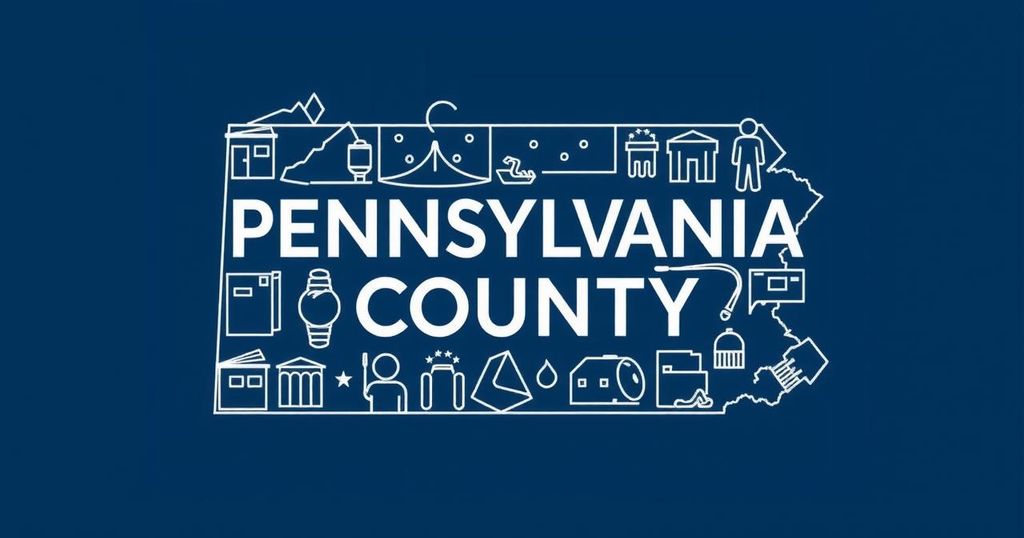Political Polarization in Bucks County: Voters Hesitate to Engage
Bucks County, Pennsylvania, presents a divided political landscape, where residents largely avoid political discussions due to fear of personal and business repercussions. The county has previously favored Democrats in close elections, but uncertainty hangs over the forthcoming presidential race. Both parties are mobilizing voters, particularly concerning mail-in ballot returns, while voters express widespread dissatisfaction with the current administration. The overall atmosphere is one of hesitation and division, indicating a challenging environment leading up to election day.
Bucks County, Pennsylvania, remains a pivotal location in the upcoming presidential election. This scenic area, known for its vibrant autumn scenery and suburban charm along the Delaware River, is a microcosm of the national political divide. Residents express a clear hesitation to engage in political discussions, citing concerns about potential repercussions in both personal and business contexts. Many voters, irrespective of their party affiliation, prefer to keep politics out of their social interactions. Bill, a local contractor and Trump supporter, encapsulated this sentiment by stating, “You don’t really hear people talking about politics. And I won’t talk about it with my customers. Let’s just say that they can come back on you in a real hurry if you disagree.” The atmosphere in Bucks County reflects a deeply fragmented political landscape. While historical data shows that Hillary Clinton and Joe Biden have managed narrow victories in the county in previous elections, the current mood is tinged with uncertainty. Steve Santarsiero, chair of the Bucks County Democratic Committee, expressed cautious optimism about Vice President Kamala Harris’s potential to secure votes but acknowledged the unpredictable nature of this electoral cycle. Harris’s campaign team is now intensely focused on mobilizing voters to ensure mail-in ballots are returned, particularly given the significant number of unreturned ballots from past elections. Santarsiero highlighted the shifting voter demographics, suggesting that a more diverse electorate may influence outcomes. On the Republican side, voters like Paul Dean openly voiced their discontent with the current administration, branding it a failure on multiple fronts. Many GOP supporters express an unwillingness to discuss politics publicly, preferring to keep their opinions confined within trusted circles. Conversely, Harris supporters advocate for a shift in leadership, articulating a desire for representation that they believe Harris embodies. Discussions among voters suggest that normalizing political discourse might require adjustments in societal attitudes toward differing opinions. This polarized environment is vividly illustrated by the lawn signs dotting the landscape—Trump and Harris supporters are physically separated only by yards yet ideologically worlds apart. Such observations underscore the ongoing tension that accompanies a fiercely competitive electoral landscape.
The article centers on the politically divided landscape of Bucks County, Pennsylvania, a critical area that has significant electoral influence in presidential races. Following a history of narrow victories for Democrats in recent elections, such as those of Hillary Clinton and Joe Biden, the county continues to grapple with an electorate split nearly down the middle. Residents express a pronounced reluctance to engage in political discussions, fearing the potential impact on personal relationships and business prospects. This hostility toward political discourse highlights a broader trend within American society, where individuals increasingly prefer silence over contentious debate. Amid this backdrop, the strategies employed by both Democratic and Republican candidates in appealing to voters are crucial, especially in the context of mail-in ballots and mobilization efforts as election day approaches.
In conclusion, Bucks County mirrors the broader national landscape of political division, where conversations about the presidential election are often avoided due to fear of backlash. As both parties prepare for an intense electoral battle, the emphasis on voter mobilization and outreach remains paramount, particularly given the county’s history of close elections. Overall, the sentiments expressed by local voters reflect a larger societal challenge of bridging divides and fostering constructive political dialogue, pivotal to the integrity and progression of democracy.
Original Source: rollcall.com




Post Comment